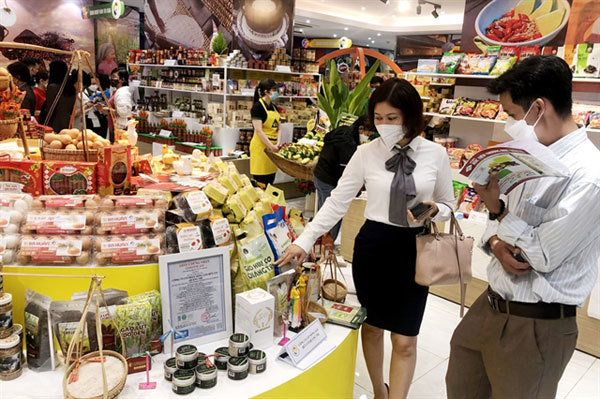 |
| Tran Phu Lu (right), deputy director of the HCM City Investment and Trade Promotion Center, discusses the quality of Vietnamese fruit on the sidelines of a meeting on Wednesday in HCM City. Photo courtesy of the centre |
Despite having crisis management and business continuity plans in place, many in the food industry have faced huge challenges caused by the impact of the pandemic.
Speaking at a seminar on recovery solutions for food companies, Dr. Huynh Thanh Dien, lecturer at the University of Economics of HCM City, said digital technology must be used by businesses as the pandemic has caused a shift from direct to online purchases, with online sales channels having a growth rate of 91 per cent in 2021.
These shifts in consumption trends have promoted a sharp increase in non-cash payments via Internet banking and payments via e-wallets.
Since the fourth COVID wave, the prices of input materials have increased and even alternative sources have been difficult to find. Firms have faced difficulties acquiring raw materials and have had to deal with transport congestion.
As a result, businesses need to apply science and technology by increasing B2B and B2C interaction and remote quality control.
In addition, enterprises must improve the quality of human resources, especially in the digital economy era. They should look for the right business philosophy to help them adapt to the new normal.
“Businesses need to build a smart and easily accessible risk management system,” he said.
Nguyen Dang Hien, general director of Tan Quang Minh Company (Bidrico), said his company has had difficulty finding raw material suppliers.
Because the pandemic has disrupted supply chains, businesses should diversify their supply chains, instead of depending too much on one or two suppliers, he said.
Nguyen Hoang Dung, director of the HCM City Institute for Research and Sustainable Development, said food businesses should take advantage of the new-generation free trade agreements (FTAs) and support policies from the Government.
To ensure food security for 7.9 billion people globally, the industry needs to be transparent, responsible and sustainable.
Tran Phu Lu, deputy director of the HCM City Investment and Trade Promotion Center (ITPC), said in recent years the city’s food and food processing industry has focused on product quality and brands in both domestic and foreign markets.
High technology has been used to ensure that products meet international standards.
“The city’s food enterprises have been proactive in researching new products, developing markets, and building reputable and competitive brands and products in domestic and international markets,” he said.
Experts said that production recovery would require better coordination between ministries, cities, enterprises, agricultural cooperatives and farmers.
Source: Vietnam News

Vietnam’s agriculture: from local to global mindset
Agriculture has always been a pioneer in the Doi Moi (renovation) process, contributing significantly to achievements in poverty reduction and food security in Vietnam.

Food safety control to be enhanced in Vietnam
Management and unscheduled inspections of food safety and hygiene should be enhanced with stricter measures as the COVID-19 pandemic had not yet been extinguished, said the National Steering committee on Food Safety and Hygiene.